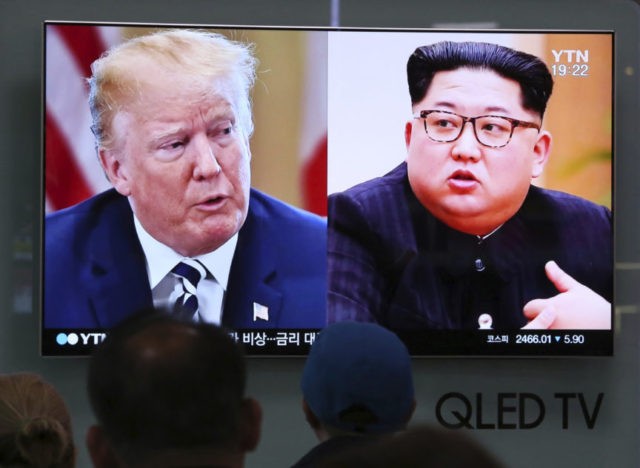The U.S. envoy charged with leading efforts towards a fully verified denuclearization of the Korean Peninsula arrived in Seoul on Sunday to prepare for a second high-level meeting between President Donald Trump and North Korean dictator Kim Jong-un.
On Sunday, South Korea’s Yonhap News Agency noted that U.S. Special Representative Stephen Biegun is expected to meet his North Korean counterpart, Kim Hyok-chol, and other regional officials “to fine-tune details, including the agenda, for the meeting between U.S. President Donald Trump and North Korean leader Kim Jong-un.”
Biegun’s arrival to the Korean Peninsula on Sunday came as South Korea is also pushing for another meeting between President Moon Jae-in and Kim “to help implement the North’s denuclearization pledge that will likely be refined in an upcoming U.S.-North Korea summit,” Yonhap pointed out in a separate article.
A prospective Moon-Kim summit would mark the fourth meeting focused on denuclearization.
“An inter-Korean summit will naturally be the next step following the second North Korea-U.S. summit,” an official from Seoul’s presidential office told Yonhap on condition of anonymity.
“It will certainly help move the denuclearization process forward if held,” another unnamed official added.
The exact date and venue of the second Trump-Kim meeting remains unknown but are expected to be announced this week. As it stands now, the summit is expected to take place “near the end” of this month, “someplace in Asia,” Trump administration officials have said.
“Seoul believes the second U.S.-North Korea summit will set further details of the denuclearization process, possibly including a timeline for each denuclearization step supposed to be taken by the communist state, along with corresponding measures by the U.S.,” Yonhap reported.
In June 2018, President Trump and Kim reached a nominal agreement to cooperate towards “denuclearization,” but the Singapore Declaration, as their joint statement was called, did not define “denuclearization” and only required of North Korea to return the remains of Americans killed during the active period of the Korean War.
The Trump administration is seeking denuclearization in exchange for sanctions relief and security guarantees for North Korea.
Last week, the American intelligence community (IC) in its annual World Threat Assessment contradicted Trump’s assertion in the wake of the U.S.-North Korea summit that “there is no longer a nuclear threat from North Korea.”
Intelligence officials listed North Korea as a significant cyber, chemical weapons, religious freedom, and nuclear threat, echoing other independent and military assessments.
The U.S. intelligence community’s report acknowledged that “some sanctions relief is necessary for additional diplomacy to occur,” adding:
Pyongyang has not conducted any nuclear-capable missile or nuclear tests in more than a year, has declared its support for the denuclearization of the Korean Peninsula, and has reversibly dismantled portions of its WMD [weapons of mass destruction] infrastructure. However, we continue to assess that North Korea is unlikely to give up all of its nuclear weapons and production capabilities, even as it seeks to negotiate partial denuclearization steps to obtain key US and international concessions.
Despite the ongoing denuclearization talks between the U.S. and North Korea, the threat assessment added, “We continue to observe activity inconsistent with full denuclearization.”
The Trump administration has vowed to keep up economic pressure until the North can verify credible steps towards the peninsula’s complete denuclearization.
North Korea has called for relief and corresponding measures for actions it has taken so far, such as the public dismantling of one nuclear test site. However, Yonhap revealed in November 2018 that North Korea failed to keep its pledge to completely dismantle one of its vital missile sites as part of its stated commitment to denuclearize the Korean Peninsula.
“North Korea’s conventional capabilities continue to pose a threat to South Korea, Japan, and US forces in the region,” the intelligence officials warned last week. “As a way to offset adversary military advantages, Kim Jong Un continues to pursue advanced conventional weapon programs and capabilities, including more accurate artillery and ballistic missile strike capabilities and [drones].”

COMMENTS
Please let us know if you're having issues with commenting.